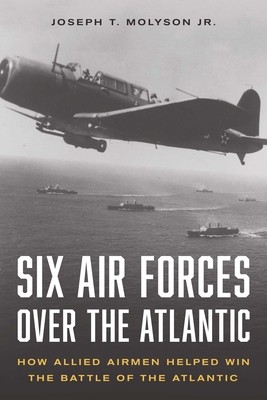
- We will send in 10–14 business days.
- Author: Col Joseph T Molyson Jr (Ret)
- Publisher: Stackpole Books
- ISBN-10: 0811775364
- ISBN-13: 9780811775366
- Format: 16 x 23.1 x 2.7 cm, kieti viršeliai
- Language: English
- SAVE -10% with code: EXTRA
Reviews
Description
The Battle of the Atlantic was the longest campaign of World War II, lasting the entirety of the war in Europe from September 1939 to May 1945. It was also one of the war's most complex campaigns, involving strategy, operations, tactics, logistics, politics, diplomacy, and alliances. During the war's first two years, the United States was drawn deeper into partnership with Great Britain, and closer toward conflict with Germany, in the waters of the North Atlantic. Franklin Roosevelt realized this theater's importance: "I believe the outcome of this struggle is going to be decided in the Atlantic." And so American, British, and Canadian forces battled Germans at sea and in the air to protect the flow of first materiel and then men from the United States to the United Kingdom. The sea part has been well covered: how German U-boats and other warships hunted Allied convoys and how the Allies ultimately turned the tide. Not so much the air war. In Six Air Forces over the Atlantic, Joseph Molyson tells the story of the Battle of the Atlantic from the perspective of the air forces--and airmen--who waged it from the skies above the icy waters of the North Atlantic. He blends big-picture attention to strategy and tactics with dramatic episodes of air-to-air and air-to-sea combat, including the engagement in which a British light bomber captured a German U-boat near Iceland. He details the close eye Franklin Roosevelt kept on the campaign, the effect B-24 Liberator bombers had, and the rise of the Royal Air Force Coastal Command as a true U-boat-busting force. The result was victory in the Atlantic, as well as a significant contribution to victory in World War II.
EXTRA 10 % discount with code: EXTRA
The promotion ends in 23d.08:54:24
The discount code is valid when purchasing from 10 €. Discounts do not stack.
- Author: Col Joseph T Molyson Jr (Ret)
- Publisher: Stackpole Books
- ISBN-10: 0811775364
- ISBN-13: 9780811775366
- Format: 16 x 23.1 x 2.7 cm, kieti viršeliai
- Language: English English
The Battle of the Atlantic was the longest campaign of World War II, lasting the entirety of the war in Europe from September 1939 to May 1945. It was also one of the war's most complex campaigns, involving strategy, operations, tactics, logistics, politics, diplomacy, and alliances. During the war's first two years, the United States was drawn deeper into partnership with Great Britain, and closer toward conflict with Germany, in the waters of the North Atlantic. Franklin Roosevelt realized this theater's importance: "I believe the outcome of this struggle is going to be decided in the Atlantic." And so American, British, and Canadian forces battled Germans at sea and in the air to protect the flow of first materiel and then men from the United States to the United Kingdom. The sea part has been well covered: how German U-boats and other warships hunted Allied convoys and how the Allies ultimately turned the tide. Not so much the air war. In Six Air Forces over the Atlantic, Joseph Molyson tells the story of the Battle of the Atlantic from the perspective of the air forces--and airmen--who waged it from the skies above the icy waters of the North Atlantic. He blends big-picture attention to strategy and tactics with dramatic episodes of air-to-air and air-to-sea combat, including the engagement in which a British light bomber captured a German U-boat near Iceland. He details the close eye Franklin Roosevelt kept on the campaign, the effect B-24 Liberator bombers had, and the rise of the Royal Air Force Coastal Command as a true U-boat-busting force. The result was victory in the Atlantic, as well as a significant contribution to victory in World War II.


Reviews